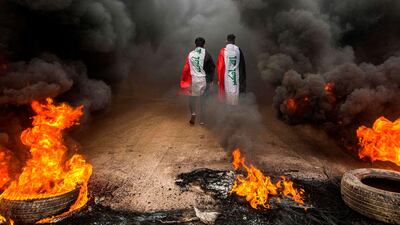Thousands of Iraqis took to the streets on Sunday in a general strike across Baghdad and southern cities to revive protests aimed at ousting the country’s political elite.
Protesters blocked roads to try to keep employees from getting to work in the Sadr City district of Baghdad.
The area is a stronghold of the populist cleric Moqtada Al Sadr, who called for a general strike to pressure politicians to carry out their promises of reform.
In the capital, protesters tried to reach the Ahrar Bridge, a day after seizing part of the Sinak bridge and the strategic Khilani Square in central Baghdad.
The bridges lead to the heavily fortified Green Zone, where government offices and parliament are located.
Students joined the crowds in Baghdad and southern cities such as Najaf, Diwaniyah, Nasiriyah and Kut to join the calls for the government to quit.
“We will not attend our lessons until the government steps down. We want a nation that gives us basic services and our rights,” Ahmed Hussien, 17, wrote on Twitter.
The protesters have been energised by support from Iraq's leading Shiite cleric, Grand Ayatollah Ali Al Sistani, in his sermon on Friday.
Mr Al Sistani called for the government to change the electoral law as demanded by protesters, which he said would restore public confidence in the system and give voters the opportunity to bring “new faces” to power.
The influential cleric said the government had not met any of the protesters' demands and that electoral reforms must be a top priority.
At least 320 people have been killed and more than 15,000 injured since the latest unrest began on October 1 with people taking to the streets to voice their frustration over corruption, lack of jobs and poor public services.
Mr Al Sistani, 89, also criticised the government for the high death toll and the kidnapping of protesters and activists in recent weeks.
He said protesters "cannot go home without sufficient reforms" but also voiced fears that authorities were "not serious" about enacting them.
Mr Al Sadr has also defended the demands of the protesters.
“The Parliament must adopt radical reforms and if it cannot then it would make no sense for officials to stay in power,” he said, and the "demonstrations have succeeded in humiliating corrupt officials and terrorists".
Mr Al Sadr, who controls the largest bloc in Parliament, encouraged the public to continue protesting.
The protesters regard sit-ins as a pressure tactic to force the government to resign or resolve the issues behind nearly two months of demonstrations.
Prime Minister Adel Abdul Mahdi remains in office weeks after President Barham Salih said he would be willing to step down if a suitable replacement were found.
"The government has failed in administering the state and to meet the protesters demands, making broken promises and responding to demonstrators' calls by resorting to violence," Mohammed Al Tai, a former member of parliament, told The National.
Nearly 60 per cent of Iraq's population of 40 million is under the age of 25, but youth unemployment stands at 25 per cent.
One in five people live below the poverty line, despite the country’s oil wealth.


